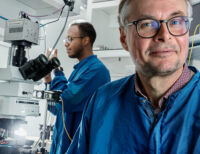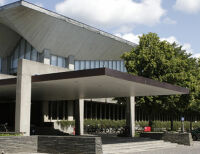Thursday 09 Sep 21
To achieve the Danish government’s goal of climate-neutral shipping in 2050, DTU has entered into an alliance with NTU in Singapore, the aim being for the universities to develop sustainable solutions with a global impact.
Every year, Danish ships emit enormous amounts of CO2, and since most ships are used to transport goods to the rest of the world, most of the CO2 emissions take place in international waters.
According to the DTU report Green Fuels in Blue Denmark, it is therefore a problem if maritime nations such as Denmark only address problems ‘in their home port’. The conclusion is that stopping global pollution will take collaboration and knowledge sharing among countries as well as industries, and this is one of the reasons why DTU has entered into a research partnership with Nanyang Technological University in Singapore.
“Singapore is extremely interesting. It is a large maritime nation, and most shipping companies operating globally have offices in Singapore. On top of which, Singapore has high ambitions, while also leading the way in innovation. So our competences go well together, ”says Head of Maritime DTU Mette Sanne Hansen.
Therefore, DTU has now established two PhD projects to mark the start of the collaboration.
Sustainability is key
The main focus of the collaboration will be on the transition from fossil fuels to the use of green fuels in the maritime sector. Here, sustainability is key.
“The whole process must be sustainable. The extraction of the fuels, their use, and getting rid of them again. The working conditions under which fuels are produced must also be sustainable. They must not be explosives, but capable of being handled safely to prevent accidents. So in that sense also, sustainability must permeate the entire system,” explains Mette Sanne Hansen.
Precisely for this reason, one of the two PhD projects—the one based at DTU Environment—is focused on the need for absolute sustainability in the green transition of the shipping sector. The other project, based at DTU Mechanical Engineering, will devise solutions on how to develop a marine engine that can run on green fuels. The method is to test how the fuels burn in practice.
“Our approach is experimental. So we have an optical engine, which is partly made of glass, so we can look at the combustion while it is happening. In addition, we can use measuring equipment to measure the emissions, and based on the data obtained we can determine what works, and what does not work,” explains Professor Anders Erlandsson from DTU Mechanical Engineering, who will be supervising the PhD project.
Torben Nørgaard, Head of Energy and Fuels, Maersk McKinney Møller Center for Zero Carbon Shipping
"DTU is doing in the academic world what the centre has focused on doing in the business world. What we have in common is the realization that a single player—no matter how big and influential—cannot do this alone. "
He sees great potential in collaborating with the NTU researchers. According to Anders Erlandsson, the NTU researchers take a more theoretical approach, which—in combination with DTU’s more experimental methods—can lead to new knowledge.
“We expect to share results for the benefit of both nations and for global shipping in general. The data will be useful for shipowners, shipyards, engine builders and not least the legislators,” he says.
Strategy attracts interest from major players
The idea of data sharing and collaboration with major players is welcomed by Mærsk Mc-Kinney Møller Center for Zero Carbon Shipping.
Established as an independent research centre in 2020, the centre has since worked for the goal of a carbon-neutral, global shipping industry by 2050. The centre has entered into partnership with a number of players, including A. P. Møller-Maersk A/S, Siemens Energy, and Cargill, and it finds DTU’s alliance with NTU in Singapore to be interesting.
“DTU is doing in the academic world what the centre has focused on doing in the business world. What we have in common is the realization that a single player—no matter how big and influential—cannot do this alone. It will take concerted and coordinated efforts,” says Torben Nørgaard, who is Head of Energy and Fuels at Maersk McKinney Møller Center for Zero Carbon Shipping.
He has already had a dialogue with DTU, and sees the expansion of the centre’s partner portfolio to include players from the world of research as the natural next step.
“Close collaboration between research and industry is crucial if we are to succeed in developing, testing, and implementing the sustainable solutions of the future. As a centre, we want to reach out to the academic world globally to ensure collaboration, and this is infinitely easier when the academic institutions are closely connected already,” explains Torben Nørgaard.
Port of Singapore could become ‘floating lab’
According to Mette Sanne Hansen, the collaboration between DTU and NTU is a good example of why the major maritime nations need each other.
Denmark is home to the world’s largest container shipping company, Maersk, and the world’s largest developer and supplier of marine engines, namely MAN Energy Solutions, while Singapore has one of the world’s largest ports. According to Mette Sanne Hansen, pooling all this expertise could have a major impact on the development of new, green solutions.
Singapore's container port is the world's second largest next after Shanghai. In 2019 the port in Singapore approximately handled 37 million containers. Photo: Colourbox.
“Denmark is happy to be a test country and use our ships as sailing green test ships, while Singapore is offering to use their port as a test port. The port can thus become a kind of laboratory for DTU’s researchers, where they can go and see what a green port might look like and how it might work,” says Mette Sanne Hansen.
However, for the transition from fossil fuels to green fuels to be realized, in Mette Sanne Hansen’s opinion, carbon emissions must be taxed. At the moment, the green fuels cannot compete with the price of oil.

















